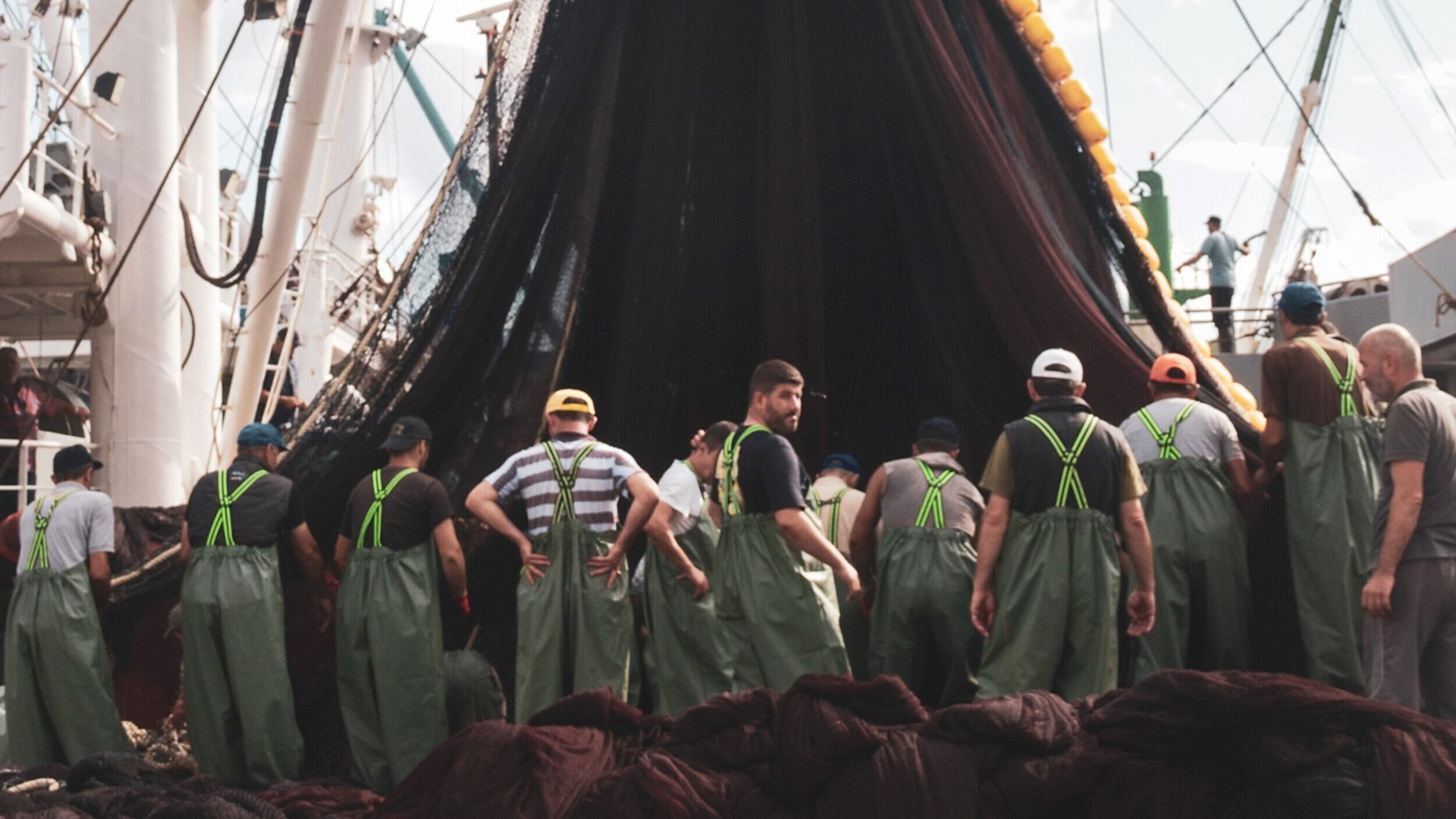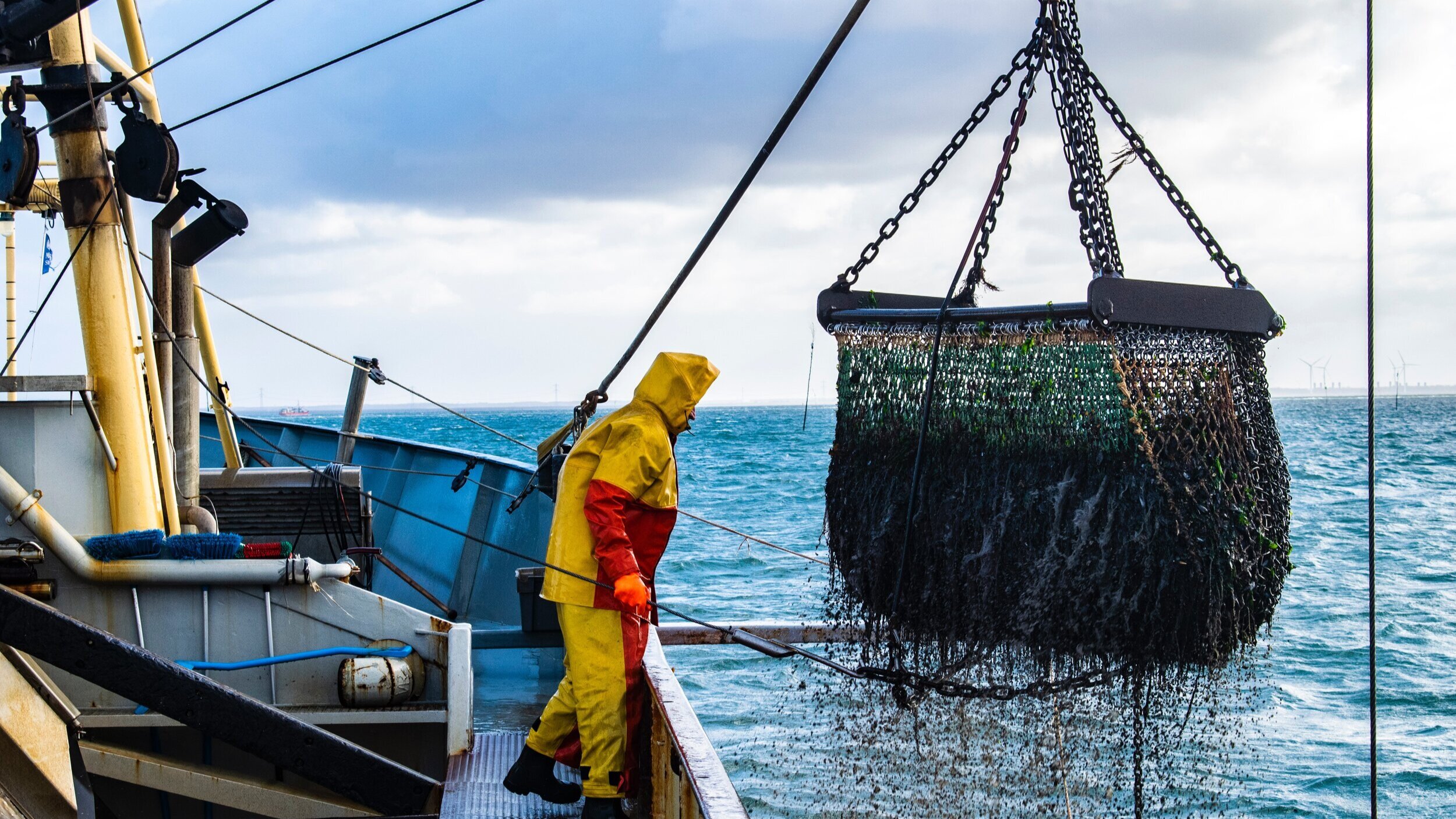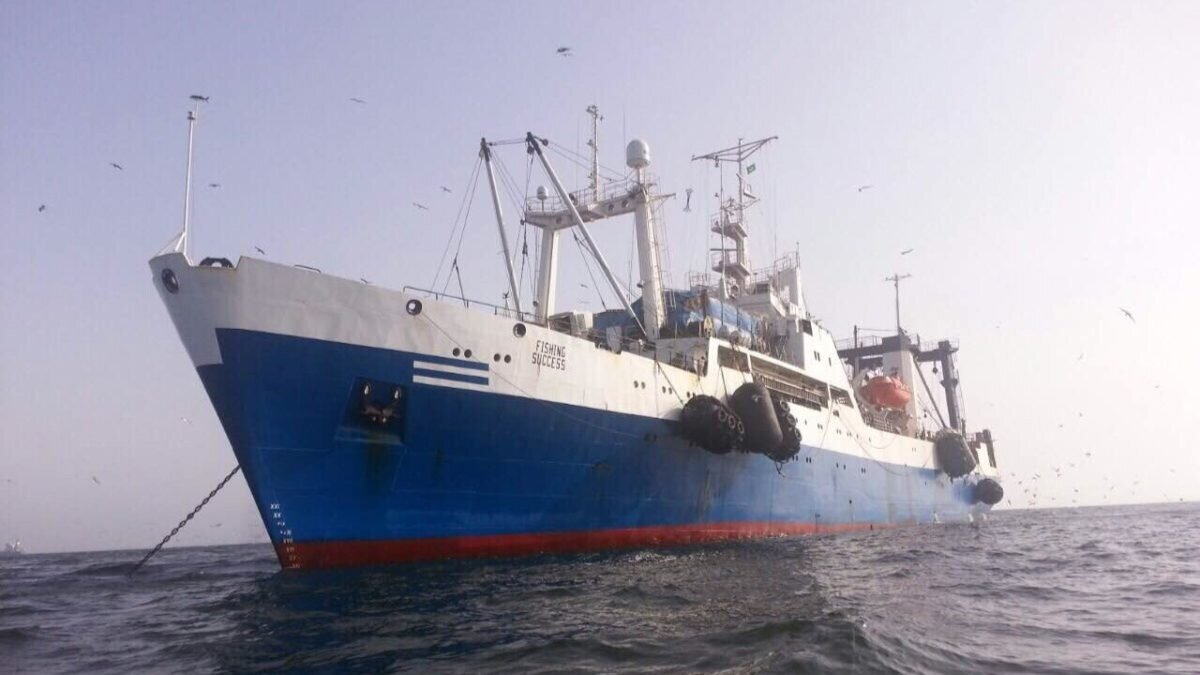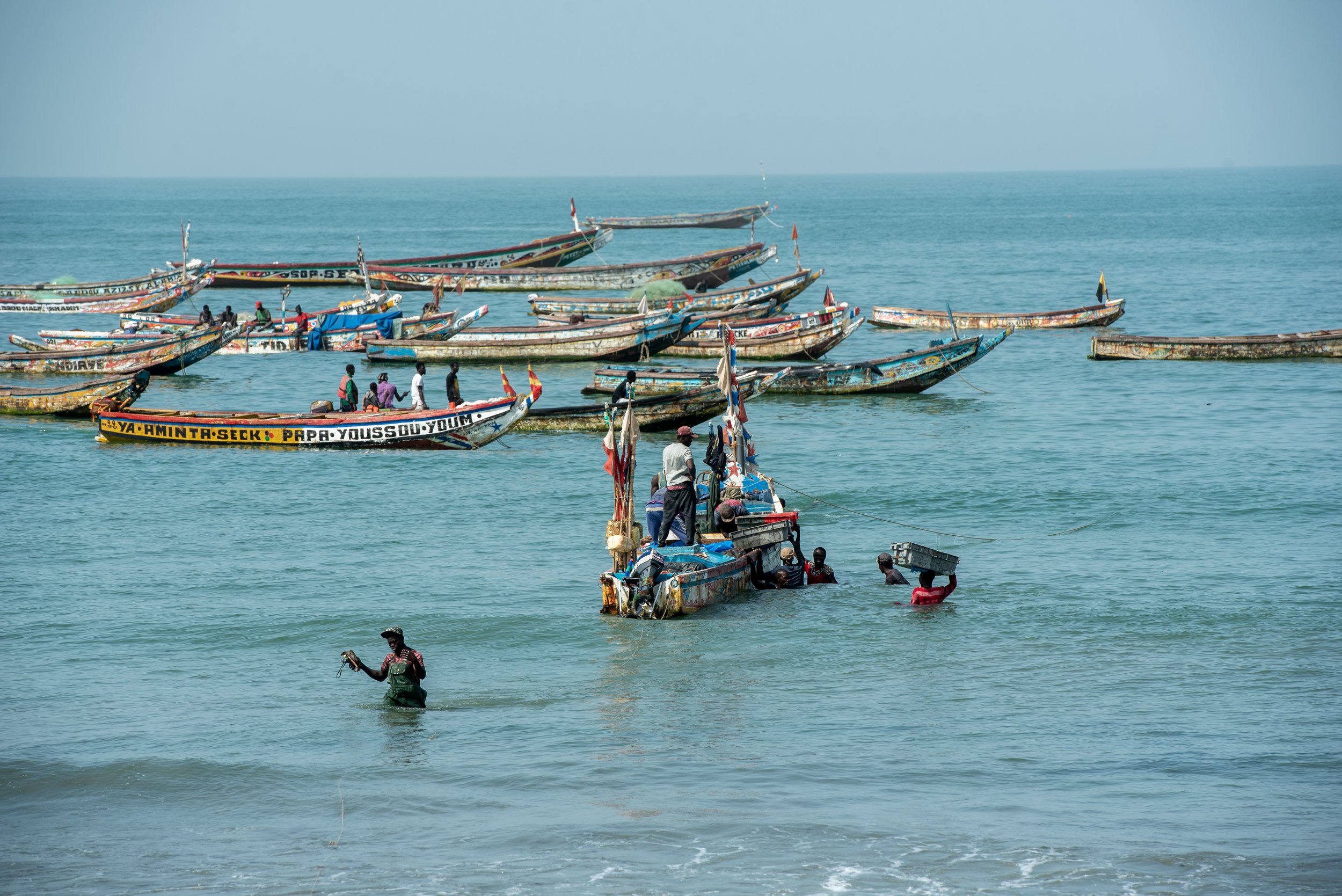Mauritania's rich waters have attracted foreign fleets for decades. With the extension of the zone closed to industrial trawlers targeting small pelagics in 2012, from 13 to 20 miles, the EU fleet withdrew, reducing the industrial fishing effort on round sardinella and reserving it for artisanal fishing.
However, the Senegalese pirogues fishing for small pelagics were replaced around 2016 by chartered Turkish seiners. The latter fish to supply fishmeal and oil factories, an industry that has been expanding since 2010 and which contributes to the overexploitation of small pelagic stocks.
In 2017, Mauritania committed to gradually reducing and then eliminating fishmeal and fish oil production by 2020. Far from being reduced, capacity has since tripled and there are worrying developments that show that the political will to reverse the trend is lacking. The lack of transparency around fishing capacity and effort, coupled with the lack of scientific data on the state of stocks, hinders a truly sustainable management of the small pelagic fisheries sector in Mauritania but also in the region. Indeed, 90% of international catches of sardinella are made in the waters of Mauritania and its neighbour, Senegal. Opacity also complicates the holding of informed and inclusive public debates of all parties concerned, especially the artisanal fishing communities.
Mauritania has positioned itself at the forefront of the Fisheries Industry Transparency Initiative (FiTI), which reports on the level of transparency in 12 areas related to fisheries. It published its first report last May, which represents a step towards greater transparency. However, this report is long overdue and only covered 6 of the areas of the FiTI standard.
On the other hand, the new Sustainable Fisheries Partnership Agreement with the EU, signed at the end of July, contains broadly the same elements of transparency and commitments to sustainability by both parties as in the previous agreement, but also contains some welcome advances in transparency, such as detailed annexes for catch declarations and an emphasis on the visibility of sectoral support action
Transparency: “A moral commitment”
Since the beginning of the FiTI initiative, Mauritania has presented itself as one of the leading countries to shed more light on the fisheries sector. As a good host, the President of Mauritania declared at the inauguration of the International Conference on Transparency and Sustainable Development that “transparency is a moral commitment” and announced the joining of the Fishing Industry Transparency Initiative (FiTI) in 2016.
Finalised in 2021, the first FiTI report will make available information on the first six requirements of the FiTI standard. Mauritania is the second country in the initiative to publish such a report, after the Seychelles.
This reporting process has improved transparency, as previously undisclosed information is now public. However, gaps remain in the area of post-harvest operations, particularly in relation to the production of fishmeal and fish oil. Furthermore, the presence of foreign fleets, either through private agreement or chartering, remains partially opaque and adds pressure on overexploited stocks of small pelagics, especially round and flat sardinella.
A) Foreign fleets
The FiTI report provided the general public with access to the texts of foreign agreements for which details were not available. On the FiTI standards website, point B.1.3. provides access to foreign agreements, such as those with the Chinese companies Fuzhou Hong Dong and Poly Hong Dong or the agreements with the Japanese Tuna Fishing Cooperative Association. The site also provides models of tuna and pelagic fishing agreements and a standard contract for chartering.
The Mauritanian fishing code institutes two fishing regimes: the national and the international. The national regime includes national vessels as well as 'foreign vessels operating under the national regime' and aims to “maximise the benefits of post-capture activities for the national economy.” But these regimes, although analysed in the FiTI report, and the publication of the number of vessels in the report, do not allow us to know what the real fishing effort in Mauritanian waters is.
For example, in the case of Fuzhou Hong Dong's vessels fishing under the Mauritanian flag, the agreement is not classified as foreign. It allows 83 vessels to fish for several types of species, including 43 artisanal fishing vessels “whose exploitation is authorised to Mauritanians.” In this regard, the Multi-Stakeholder Group stated: “This is a controversial agreement and its relevance remains to be proven insofar as neither the characteristics of the vessels (size, power), nor the expected catches are provided.”
Another type of regime, the chartering of bareboat vessels, allows the vessel to keep its flag, with the authorisation of the Ministry of Fisheries and Maritime Economy and on condition that it takes the necessary steps to operate under Mauritanian jurisdiction. Thus, apart from the Senegal-Mauritania agreement signed on 12 July 2021 which organises the access of a certain number of Senegalese pirogues to Mauritanian waters, a series of other chartered Senegalese purse seine pirogues fish in Mauritanian waters. But it is also under this regime that some 40 chartered Turkish purse seiners, which since 2016 have replaced Senegalese artisanal fishermen targeting small pelagics, are found. According to many sources, their total effort has increased significantly since 2017.
Access under the international regime is done under an agreement or arrangement with a third country or a private entity. “Access under this foreign regime entails the obligation to land catches in Mauritania (in designated ports) unless derogations are made for technical, economic or general policy reasons.” Other foreign vessels can fish under the other pelagic conventions. For the latter, in 2018 there were 29 active vessels fishing small pelagics under 5 flags, including 11 Russian vessels and 10 under the Belize flag.
B) Fishmeal industry
The FiTI National Multi-stakeholder Group report does not cover the post-capture area. As highlighted for years by many regional actors, experts and civil society, the expansion of the fishmeal industry in Mauritania -and in other countries in the region- contributes strongly to the overexploitation of small pelagics in West Africa. With a ratio of at least 5 kg of fresh fish to 1 kg of meal, the diversion of small pelagics from human consumption to intensive aquaculture in countries such as China and Norway is undermining food security throughout the region and depriving women processors of raw material and therefore of jobs.
Mauritania had put in place several measures to preserve stocks, which did not produce the expected results. For example, the pelagic trawler fleets that had been sent offshore by extending the coastal fishing zone from 13 to 20 miles were replaced by a chartered foreign fleet of Turkish origin targeting sardinella to supply fishmeal and oil factories. Following complaints from local fishermen, the government had limited each factory to 10,000 tonnes per year of small pelagics - or more, as long as they were not round sardinella. As the quantity of other species was not limited, the measure was ineffective as there was no control over the composition of the species used.
Other measures in 2017 to “strengthen food security” were to raise export taxes from 1% to 8% and to increase control, with the aim of increasing processing activity for human consumption from 0% to 15% until it reaches 60% in 2020. However, by the end of 2020, the opposite had happened: more than 25 factories were active and official figures confirmed that almost 33,000 tonnes of fishmeal and fish oil had been exported in the first quarter alone. This is in practice three times more exports than in 2010, and a far cry from the planned phase-out promised by the authorities for 2020.
Over the past five years, Mauritania has neglected sampling of landings in fishmeal factories. This has resulted in a real lack of data on stocks, even though experts know they are overexploited. The FAO Working Group on the Assessment of Small Pelagics off Northwest Africa has recommended increased sampling and reduced fishing effort on sardinella each year, but no action has been taken.
Given the situation, the policy in such a case should be to adopt the precautionary approach. However, the policy seems to continue on the same trend. Just a month ago, a Mauritanian journalist raised the alarm about the derogation for a 40-metre purse seiner of Turkish origin to catch pelagics in a zone reserved for artisanal fishing. The authorisation “to improve access to fish products for the population” and labelled as “experimental fishing”, according to the government, raised questions and criticism from many stakeholders, given that the vessel does not have a cooling system and has previously supplied fishmeal plants in 2020 and 2021.
2. Even more transparency: the fisheries agreement with the EU
Two years after the expiry date of the agreement and following two one-year extensions of the protocol, lengthy negotiations, also troubled by the Covid-19 pandemic, have finally resulted in a new Sustainable Fisheries Partnership Agreement (SFPA) between the European Union and Mauritania. The text of the agreement and the protocol are now in the European Parliament for discussion.
Some changes can be noted such as the enlargement of the fishing zone for small pelagics - conditional on the elaboration of a management plan and which should be evaluated at the next Joint Committee -; a model report annex in relation to the presence of fleets in Mauritania and their activities; and additional provisions concerning the embarkation of seafarers in order to better align the agreement with ILO Convention 188 on work in fishing.
A) The transparency clause
Inserted in the protocol of the previous agreement, the transparency clause required Mauritania to publish the information necessary to make the fishing effort in its waters obvious (private agreements, number of authorised vessels, etc.). The inclusion of this article was a positive but insufficient step. The retrospective and prospective evaluation of the agreement, published by the European Commission in March 2019, underlined in its summary that Mauritania “has not fully complied with the transparency clause” as it had not “submitted on time” nor in an “exhaustive manner” the information on the activities of the fleets in Mauritanian waters.
The assessment also points out that this has hampered the work of the Scientific Committee and the Joint Commission. Indeed, in order to identify a potential surplus and given the EU and Mauritania's commitments to sustainability and transparency, it is essential that this information be public.
Furthermore, without transparency it is impossible to know whether Mauritania is effectively applying the non-discrimination clause (art. 1§4 (2015) and art. 4§4 (2021)), which seeks to create a level-playing field and which prohibits the third state from granting other fleets present in its waters more favourable conditions than those granted to EU economic actors.
The publication of the FiTI report is already a step forward because, although with some limitations that were highlighted by the multi-stakeholder group, stakeholders now have a rough overview of the fishing effort ...in 2018. Nevertheless, it is worth mentioning that on the dedicated government website, the Ministry has published more recent agreements and that the FiTI report for 2019 is expected to be released soon.
An unprecedented annex to the new agreement with the European Union provides for the annual report on fishing activities in the Exclusive Economic Zone (EEZ) on the part of Mauritania, which aims to apply the transparency clause, “as well as to verify the evolution of the remainder [...] after taking into account the exploitation capacity of the national fleets.” This exhaustive model includes the complete table of licences by type of fishing (artisanal, coastal and deep-sea) and by regime (national - Mauritanian flag or chartered, and foreign), and tables concerning the total catches made by species. It is hoped that Mauritania will respect the commitments made to the FiTI and the EU.
Compliance with these commitments in relation to catches will also make it possible to remedy the lack of scientific data, without which it was possible to really determine a remainder. The enlargement of the fishing area under the condition of a management plan is also welcome, as well as the determination of axis 3 for sectoral support to strengthen scientific research. A review clause from the third year onwards would allow the quantities to be reviewed by the Joint Scientific Committee and subsequently by the Joint Committee. All this should contribute to more transparent and better informed decisions for the conservation of fisheries resources in Mauritania.
In the latter agreement, Article 10.4 also notes that the parties shall encourage “the promotion of investments for mutual benefit.” In a joint position in the summer of 2020, the African Confederation of Artisanal Fisheries Organisations (CAOPA) and CAPE called for a more transparent and sustainable framework to be established for these foreign-owned national companies, “a sine qua non for this type of investment to be environmentally and socially sustainable.”
B) The confidentiality clause
In 2020, it was reported that two vessels flying the flag of an EU Member State had not respected the fishing zones established under the agreement with Mauritania, by fishing very close to the coast, which is illegal. These vessels, the KAPITAN MORGUN and the FISHING SUCCESS, flying the Latvian flag and belonging to a Russian-owned company, BALTREIDS, are fishing under the EU-Mauritania fisheries agreement and systematically refuse to take scientific observers on board. The lack of information on beneficial owners is a major obstacle to their accountability.
This protocol provides for the processing of several categories of personal data, including “the activities of a vessel [...], its fishing activity or [...] related [...];” and those “relating to vessel owners and operators” (See article 17§3 of the 2021 protocol). It is clear that this data will be processed but not published, as this paragraph is in the article concerning the confidentiality of commercially sensitive data. However, the publication of this information is also important because issues related to the activities of these beneficial owners, such as illegal fishing, corruption, money laundering, are of public interest.
As a first step to lifting the secrecy on beneficial owners, the EU had put in place in 2017 the EU Regulation on the sustainable management of external fishing fleets (SMEFF Regulation) . This legislation provides for the European Commission to maintain an electronic database of fishing authorisations, including information on beneficial owners of operations carried out by vessels flying the flag of an EU Member State.
To date, this information remains confidential. Facilitating public access to the beneficial owner information contained in this database (name, city, country of residence of the owner and of the top five beneficial owners, as well as the nature and extent of the beneficial interest held) would be a good first step in creating transparency on beneficial ownership.
C) The social clause
In 2015, a social clause was agreed by the European social partners to ensure decent working conditions for non-EU fishermen working on board vessels operating under SFPAs. This clause applies the fundamental principles and rights at work and the eight core ILO conventions. It also covered remuneration levels, their negotiation modalities, pay slips and employment conditions for fishermen.
The 2015 protocol with Mauritania had already introduced fairly detailed requirements before allowing the embarkation of local seafarers. These included the possession of an original copy of the seaman's signed employment contract, which guaranteed his rights and avoided an arbitrary situation. A new appendix (11) to the agreement further strengthened these requirements by requiring the contract to specify “the amount of the seafarer's wages or, if paid by share, the percentage of his share and the method of calculating it [...],” rest periods, reference to the collective agreement, etc.
These developments are welcome because, in practice, it is very difficult to keep an eye on the implementation of this social clause because the majority of European shipowners take on board seafarers through the services of fishing agents. These agents, usually citizens of the third country, prepare “the way for fishing vessels working in countries considered difficult” and act as intermediaries vis-à-vis the third State and/or the seafarers.
The new Appendix 11 also sets a condition that the seafarer must be in possession of a certificate attesting “that he has received basic safety at sea training.” CAPE had noticed, following feedback from actors on the ground, that the seafarers taken on board were not necessarily those who had been trained and that embarkations were not made according to transparent criteria. It is to be hoped that these criteria will now be respected for the safety of all seafarers on board.
D) The sectoral support implementation unit
Both local fishing communities and civil society in Brussels criticise the lack of transparency in the allocation and use of sectoral support funds. The agreement with Mauritania is by far the most expensive of the EU's sustainable fisheries partnership agreements with third countries. 4.1 million per year in the old protocol and a similar figure for the new one, the Commission has announced that there will be no payment for the first year, as there is still a significant residual from the old protocol.
The 2019 evaluation of the agreement stressed that “the EU is concerned about the public cost [...] and would like to see more coordination.” Specifically, in a joint position of European and African NGOs and artisanal fisheries organisations in May 2020, including Mauritanian fishermen, they called for “public funds to serve the public good”, highlighting the major challenges of transparency in the decision-making process for the allocation of funds.
In the last 2015 protocol, it was agreed that sector support would be managed by an 'Implementation Unit' which was “responsible for coordinating the implementation in collaboration with the beneficiaries” of the selected projects (see Annex 2 of the protocol, Article 3.2). This measure aimed to overcome the lack of transparency and participation of beneficiaries. A final report on the implementation of each of the measures and projects was to be published and an annual workshop was to be organised to present it to the beneficiaries (See Annex 2 of the protocol, articles 3.3.3 and 3.3.7). According to the local communities, this was only partially done as only the cell had been set up.
Annex 2 of the new protocol simplifies the provisions by clarifying the role of the cell, the reporting templates and seeks to improve the monitoring of funds. In practice, however, the text still does not guarantee the participation of local communities: the coordination unit is designated by the Ministry (art. 19 and 20) and participates in the identification of projects (art. 24) for approval by the joint commission. A restitution session should present the finalised actions (art.38).
Despite a new reference to the visibility of projects, which could be ensured by, inter alia, the “public dissemination of reports and completed studies” (Article 52), the latter provision remains at Mauritania's discretion. As requested by civil society and local communities, the EU and Mauritania should publish annual reports on the implementation of sector support. This would be a first step in shedding light on how funds have been spent, but it would also allow for a more rigorous monitoring of funds and activities and would allow for more coherence with other funds for local fisheries development.
Conclusion
Transparency in fisheries is essential for sustainable fisheries management, for consistent resource conservation choices, for the fight against corruption and for the effective participation of all stakeholders in decision-making.
Following the recent announcement that Madagascar had joined the FiTI initiative, the Confederation of African Artisanal Fisheries Organisations (CAOPA) issued a press release stressing that transparency should not be voluntary, but should be seen as a right. While they congratulate the countries that are committing to the FiTI initiative, they point out that “many countries have signed legally binding conventions on access to information, which means that a lack of transparency can be challenged in court.”
In this regard, they cite the Aarhus Convention (Convention on Access to Information, Public Participation in Decision-making and Access to Justice in Environmental Matters), finalised in 1998, to which the European Union is a party, and call on the African Union to develop its own 'Aarhus Convention'.
The EU should use the opportunity of the EU-Africa Summit, due to take place in Paris in February 2022, to support this demand from African artisanal fisheries and to promote greater transparency and participation of the communities concerned beyond the Sustainable Fisheries Partnership Agreements, especially with regard to the broader issues of ocean governance.
Header photo: Illustration photo by Lachlan Dempsey/Unsplash


















The Sustainable Fisheries Partnership Agreement (SFPA) between the EU and Mauritania is an opportunity to implement the “new generation” of agreements announced by the Commission, which should focus on the equitable sharing of benefits, local development, and the well-being of coastal communities that depend on fishing.